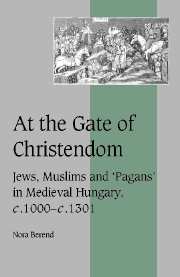Book contents
- Frontmatter
- Contents
- List of maps
- Acknowledgements
- List of abbreviations
- INTRODUCTION
- 1 HUNGARY: A FRONTIER SOCIETY
- 2 CHRISTIANS AND NON-CHRISTIANS
- 3 THE LEGAL POSITION OF HUNGARY'S NON-CHRISTIAN POPULATION
- 4 NON-CHRISTIANS IN HUNGARIAN ECONOMY AND SOCIETY
- 5 CONFLICTS BETWEEN THE PAPACY AND THE KINGS
- 6 CHRISTIAN PERCEPTIONS AND ATTITUDES
- 7 NON-CHRISTIAN COMMUNITIES: CONTINUITY, TRANSFORMATION, CONVERSION AND ASSIMILATION
- CONCLUSION
- Appendix 1 Hungarian kings of the house of Árpád
- Appendix 2 Toponyms, with Latin and German equivalents
- Appendix 3 The manuscript tradition of the Synod of Buda (1279)
- Bibliography
- Index
- Cambridge Studies in Medieval Life and Thought Fourth series
3 - THE LEGAL POSITION OF HUNGARY'S NON-CHRISTIAN POPULATION
Published online by Cambridge University Press: 06 January 2010
- Frontmatter
- Contents
- List of maps
- Acknowledgements
- List of abbreviations
- INTRODUCTION
- 1 HUNGARY: A FRONTIER SOCIETY
- 2 CHRISTIANS AND NON-CHRISTIANS
- 3 THE LEGAL POSITION OF HUNGARY'S NON-CHRISTIAN POPULATION
- 4 NON-CHRISTIANS IN HUNGARIAN ECONOMY AND SOCIETY
- 5 CONFLICTS BETWEEN THE PAPACY AND THE KINGS
- 6 CHRISTIAN PERCEPTIONS AND ATTITUDES
- 7 NON-CHRISTIAN COMMUNITIES: CONTINUITY, TRANSFORMATION, CONVERSION AND ASSIMILATION
- CONCLUSION
- Appendix 1 Hungarian kings of the house of Árpád
- Appendix 2 Toponyms, with Latin and German equivalents
- Appendix 3 The manuscript tradition of the Synod of Buda (1279)
- Bibliography
- Index
- Cambridge Studies in Medieval Life and Thought Fourth series
Summary
Laws are one of the major sources on the position of non-Christian groups in Hungary. Medieval definitions of a group's legal status are important indicators, although not necessarily a mirror, of that group's place in society. The first part of this chapter, therefore, analyses the laws and privileges defining the legal position of the non-Christian groups in Hungary. The second part of the chapter considers the degree to which non-Christian communities possessed internal autonomy. Finally, the third part is a comparison of the legal position of non-Christians and Christians. This then enables me to address questions concerning the legal foundation of non-Christian status in medieval Hungary. To what extent was the non-Christian population legally separated from the Christians? Did non-Christians have a different legal status from the other inhabitants of the country, and if so, of what did these differences consist?
THE LEGAL STATUS OF JEWS
Jews were consistently designated as Judei in Hungarian sources, as elsewhere in medieval Europe. The designation also signalled a legal category. It entailed certain privileges and certain restrictions, the content of which depended on the king of Hungary, who was at times pressured by nobles and ecclesiastics to increase restrictions. Two assertions concerning the Jews of Hungary have often been repeated: that Jews were serfs of the royal chamber according to the German model, and that prominent members of this group were nobles, elevated to that status by the king. As discussed in detail below, neither are accurate evaluations of Jewish status in medieval Hungary.
- Type
- Chapter
- Information
- At the Gate of ChristendomJews, Muslims and 'Pagans' in Medieval Hungary, c.1000 – c.1300, pp. 74 - 108Publisher: Cambridge University PressPrint publication year: 2001



